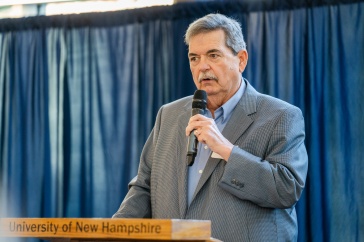
Professor of economics Bruce Elmslie studies international economics
If Bruce Elmslie, Paul College professor of economics, has his way, readers of the Journal of Economic Perspectives are in for a rousing good read in the Spring 2018 edition.
That is when the highly influential journal will publish Elmslie’s revaluation (and revelation) of Adam Smith’s historic contribution to our under-standing of how international markets work.
Since publishing The Wealth of Nations 241 years ago, the Scottish economist and moral philosopher has enjoyed a reputation as the father of modern economics for his exposition of peoples’ innate drive to barter and trade as a means of improving their condition, and of the ways a nation’s institutions can either create or hinder prosperity. The book set many of the terms for discussing issues such as labor, capital, supply and demand and free markets within a given society.
Economists have long held that what it failed to explain is how markets behave between and among different nations. Elmslie’s paper seeks to change this view.
“Smith’s exclusion from discussions of inter-national economic theory began with David Ricardo, an 18th-century economist who espoused the idea of ‘comparative advantage,’ which holds that nations specialize in what they do relatively well and trade with one another,” Elmslie said.
Comparative advantage is still considered a major regulator of net trade. However, in the early 2000s international trade flows came to be understood by the size and proximity of trading partners, an economics application of Newton’s theory of gravity that Smith was the first to make, according to Elmslie.“
Smith believed that just as gravity creates a physical equilibrium in the universe, economic behavior seems to be governed by an equilibrat-ing force. The power of attraction increases with size and dissipates with distance,” Elmslie said.
This explains why it’s more advantageous for somebody in the U.S. to ship their products to Canada rather than Turkey.
“Gravity notwithstanding,” Elmslie added, “Smith looked at the world in a very simple way. Nations, like people, need incentives to trade and prosper. During the past 30 years or so, understanding this has released many people from poverty in places such as India and China.”
-
Written By:
Dave Moore | Freelance Writer



















































